- Home
- Julie Hyzy
Whitehouse Chef 04 - Grace Under Pressure Page 10
Whitehouse Chef 04 - Grace Under Pressure Read online
Page 10
According to this article, the folks who invested with Taft were, by and large, sophisticated men and women who should have known better. The victims mentioned in the piece read like a who’s who of the entertainment world. That Taft had managed to entice them into his financial lair was beyond belief. And yet—there it was, in black and white.
The intercom buzzed. “Detective Rodriguez is here,” Frances said.
I stood to greet him as he entered, inquiring about Flynn. Rodriguez scratched the back of his neck. “The kid’s tracking down a couple of leads.”
“Leads?” I asked. “That sounds like good news.”
Rodriguez waved down my enthusiasm as we sat. “Don’t get excited. We couldn’t hold Percy any longer, so my partner is shadowing him. Hoping the guy who hired him pays him another visit.”
“So, you’re no further along than you were yesterday.”
His brown eyes met mine and I caught a glint of steel in their depths. “We’ve got all our samples sent to the state crime lab, experts going over the threatening letters, and every available man canvassing the area—including interviewing your hotel guests—working ’round the clock. Maybe we don’t have anyone in custody yet, but it won’t be long.” He narrowed his eyes. “Trust me.”
I knew the police had been questioning all our guests. We had received a number of complaints—people asking why their vacations were being interrupted and held hostage to this murder investigation. I supposed they expected the guilty party to be found and brought to justice in an hour—just like on TV.
Rodriguez worked his tongue inside his mouth. “You wanted to see me? What’s up?”
“That fake detective came to visit me this morning.”
“Tooney?”
“The same.” I told Rodriguez about the altercation on my driveway.
As always, the detective took copious notes. “I wouldn’t be so worried about that guy,” he said, scribbling. “Tooney’s harmless. He’s just a frustrated wannabe.”
Sounded like a cop-out to me—but I kept that observation to myself for the moment. No sense in antagonizing a man with a gun.
“Will we open today?” I asked. “Not that I want to rush your investigation. I’m just curious. The sooner we have an idea of our opening, the better prepared we’ll be.”
“My team will maintain presence in the fourth-floor study where the murder took place, but otherwise, I think we’re okay. You can probably open up for business this morning.”
Probably. That wasn’t much of an answer.
In order to pin him down, I picked up the phone. “I’ll call my assistant now and give her the all-clear. You’re good with that, right?”
He nodded and I made the call. When that was done, he started to push himself out of his chair. “Was there anything else, Ms. Wheaton?”
“As a matter of fact, there is.”
He reluctantly settled himself again, looking at me with an expectant expression.
“Did you get to talk with Jack Embers?”
“Yeah, we got a description from him, too.” He made a face of disgust as he hoisted himself to his feet. “Not much to go on.” At the doorway, he stopped, looking up at the ornate ceiling and across the walls, past the artwork and other treasures. “You live in a place like this . . .” he gestured out the window, “. . . in a little haven like Emberstowne, and you think nothing bad is ever going to happen. That’s the problem, y’see? Nobody here knows what’s really out there. Everybody is just content to go about their business. Nobody has the edge they need to fight. Why? Because we don’t usually have criminals here.”
“It’s a nice way to live,” I said.
“Yeah, well,” he said, mouth twisting into a rueful smile, “it was.”
Chapter 12
“LOOK AT THE COLORS, WOULD YOU?” LOIS said, awe dropping her voice to a whisper. “I had no idea RH Galleries would do such a marvelous job.”
Lois was an assistant curator, which is to say she now worked for me. When I’d been hired, I’d asked for a departmental organization chart only to be told such a thing didn’t exist. Marshfield’s staff had grown over the years, but there were no clear lines delineating who reported to whom. The only mandate that seemed clear was that everyone eventually reported to Abe.
Lois had been on staff for about fifteen years. Early forties, chubby, with blond hair and a quick smile, she was one of my favorites, even from my first day. She worked on the second floor of the administrative wing, one level below my office. We had three people in that area, all of whom were assistant curators. When I’d been hired with that title, I had asked about the reporting structure. Were these three other assistants my peers or subordinates? And how did Frances fit into the picture? I was told, vaguely, that it would all work out and not to worry. So eager was I to work in the palace of my childhood dreams that I accepted Abe’s promise at face value.
And now that he was gone, I realized I would have to sort all this out on my own.
We stood amidst a musty collection of junk in one of the second-floor bedrooms in the mansion’s east wing. With a view to the north and an adjacent bath, this had once been a busy guest room. Now it served as a staging area for our discoveries. In a place as big as Marshfield, there were many areas left unexplored. We were forever finding trinkets and treasures in hidden niches and little-used rooms.
This former bedroom was being used to store items we hadn’t yet decided where to place, and for items as they waited to be picked up for repair. Well lit, trimmed in dark oak, as was most of the rest of the manor, this room had been stripped bare of any ornamentation. Good thing, because it was as cluttered with artifacts and artwork as Bennett’s private room had been.
I took a step closer to the portrait of Warren Marshfield, Jr., understanding the basis of Lois’s admiration. The painting had been brought back to vibrant life after spending decades in dusty storage. “Wow,” I said. “Looks like we made a good decision, huh?”
For the first time since Marshfield Manor opened as a museum, we had chosen to have one of its treasures restored at an Emberstowne establishment rather than send it out to one of our regular restoration experts. The reason for this was twofold. One: We liked the idea of supporting our local merchants; and, two: the owner of RH Galleries, Roxanne Heath, had been begging us for months to give her a try. We finally had with this painting discovered in the attic. With dozens of family portraits lining the walls of this grand castle, the risk of sending one insignificant piece was small. It had been so covered with grime that we hadn’t even been able to discern the artist’s name.
But now . . .
“Take a look at this,” Lois said, handing me a note.
Roxanne’s stationery was embossed with a gold lower-case rh on the front. I opened the crisp vanilla vellum and read:
Words cannot express my thanks to you for entrusting me with such a valuable piece from your collection. Thank you for allowing me to work with this treasure.
Sincerely,
Rox
I turned to Lois who grinned. “Is she being sarcastic, or is she really this excited?”
“I think she means this.” Lois pointed to the signature on the painting’s lower right.
“No way,” I said.
“Way.”
I twisted toward the room’s desk, but Lois was quicker. She grabbed the brass-handled magnifying glass and handed it to me, her smile getting wider by the moment. “I couldn’t believe it when I saw it.”
Carrying the painting closer to the window for natural light, I stared down at the signature, guiding the magnifying glass up and down until the name was clear. “Wow,” I said, looking up at her. “And this gem was tucked away in the attic all these years?”
“Getting grungier by the day.”
I felt my smile grow as big as Lois’s. “We rescued it,” I said, then looked more closely. “Now we just have to verify that this is, indeed, a genuine Raphael Soyer.”
“You doubt it?”
>
“I take God on faith,” I said. “All others pay cash.”
She laughed. “Can you imagine how much this is worth if it’s real?”
I nodded. “I’ll put it in one of the safes. At least until we call in an expert to verify its authenticity. Can you arrange for that?”
“I’ll get right on it.”
I walked back to my office via the public corridors, carrying our happy discovery, pleased to see the manor teeming with visitors. Some carried a digital playback device hanging from a sturdy lanyard around their necks and wore buds in their ears. These audio guides were provided to narrate the mansion’s history at whatever speed the guest preferred. This experience was relatively new—we’d just begun offering it a month ago but already demand was far outstripping our supply. I made a note to confirm delivery of the next order of players. They couldn’t get here quick enough.
Docents roamed the area as well. Some were stationed inside rooms to prevent people from crossing the velvet rope barriers; some stood in the hallways, eager to answer questions or provide directions. All of them, male and female, wore the same standard-issue uniform: navy blazer with the Marshfield coat of arms embroidered on the chest pocket, tan slacks, white shirt, and red tie. I nodded hello as I passed, smiling at the individuals who smiled back, clearly pleased to be back at their posts.
I turned the corner, headed toward the back stairs. As I approached, a male docent just ahead of me twisted away suddenly as though responding to an unexpected noise. I hadn’t heard anything. He froze in that position then trotted down the corridor, away from me.
“Hello,” I called to his departing figure. “Is something wrong?”
He didn’t turn. Rather, he picked up his pace.
I called to him again.
He had to have heard. But still he ignored me.
The mansion had back stairs that the staff used when not escorting guests, more or less hidden from view by doors that looked like regular room doors. The guy ahead of me bypassed these and ran down the wide, main staircase—weaving from side to side as he dodged visitors trudging up.
With the painting in my hands, I was unwilling to break out into a full run. “Wait, please,” I called again.
As he turned at the stair’s landing, I finally got a look at his face. “You!” I shouted, surprise bringing me to a halt.
People turned at my exclamation. Reluctant to cause a scene, I bit my lip, grabbed my walkie-talkie, and called for security as unobtrusively as I could manage while resuming a more sedate pursuit. The last thing we needed was for our guests—with the recent murder on their minds—to stampede out the door in panic.
My quarry stopped at the bottom of the stairs long enough to give me a sheepish wave, then Ronny Tooney took off for the back exit, as fast as his sneaky legs could carry him.
“WHAT IS IT WITH THIS GUY?” I ASKED TERRENCE Carr when we met in my office later. “How is he getting in?”
Carr didn’t sit. He paced the office, stopping to stare out the windows before answering. “I thought we’d covered every possible entrance point. And how the hell did he get out?”
I couldn’t answer that. “Your guys were on the scene in seconds.”
“And yet he disappeared.” Carr’s voice held a mixture of disbelief and disgust. “Again.” He turned from the window to face me. “When you saw him, did you notice if his blazer had the embroidered crest on the pocket? Or was it plain?”
I thought back to the run through the corridors. The only good look I got was when he’d been one flight below me. I’d been concentrating on his face, not his apparel. “Can’t say for sure.”
“Have laundry do an inventory of uniforms. I want to know if any have gone missing.” Carr’s nostrils widened as he took a deep breath. “Could be he was just wearing the right colors and nobody noticed it wasn’t regulation. We’re going to have to train everyone on staff to be more alert.”
“What do you think Tooney wanted?”
“He wants to be part of the process. Badly.”
I’d watched plenty of cop shows in my day. “Isn’t that usually the mark of the guilty party? To try to insert himself into the investigation?”
Carr was about to answer when Frances walked in. Without knocking.
“You’ll want to see this.” As she handed me an envelope, she gave Carr a meaningful glance. “You’ll want to see it, too. We got another one.”
I held the plain, white business envelope by its edges and peered into the open top. The paper inside appeared to be cream-colored construction paper. Frances wasn’t kidding. This was another threat. “You didn’t touch the letter, did you?” I asked.
She flashed a look of disdain. “What do you think?”
Carr sprinted around the desk and by the time I opened my drawer, he’d pulled a pair of latex gloves from his belt and donned them. “Allow me,” he said.
“Hang on.”
I handed him a pair of extra-long tweezers. “We handle a lot of delicate things in this office. I like to be prepared. Here, take my seat.”
He sat, nodding a distracted thanks, focused entirely on the envelope. Before pulling out the sheaf inside, he shot a glance to Frances. “Call Detective Rodriguez. He’ll want this for evidence.”
As she reached for the phone on my desk, Carr snapped, “Use your phone. I don’t want to feel crowded here.”
Frances wrinkled her nose at the directive—clearly miffed to be ordered out.
As she crossed the threshold, I whispered to Carr, “How much you want to bet she’ll be back in under a minute?”
He broke concentration long enough to grin. I’d positioned myself to his left, one hand on the desk, the other on my hip. If he felt as though I was crowding him here he didn’t mention it and I wasn’t feeling particularly polite. All I wanted was to get a look at this new message before the police whisked it away.
He laid the envelope on the desk facedown with the slit side facing right. Gingerly, he lifted the back of the envelope and grabbed the letter inside with the very tips of the tweezers. He swallowed, and though the room was comfortable a tiny trickle of sweat formed directly in front of his left ear.
“Should we call Bennett down?”
He stopped his maneuvers and squinted off into the distance. “Let’s wait. He’s got plenty of time to get worked up again. No sense in bringing that on too early.”
“Somebody is with him, right? Keeping an eye on him?”
Carr nodded. “Two guards every moment he’s not in his rooms, and two others as often as possible when he is. Mr. Marshfield is not happy with this arrangement and keeps kicking the guards out. Frustrating.” Licking his lips, Carr returned his attention to the process at hand.
I held my breath as he tugged at the construction paper. The coarseness of the document made it difficult to slide and Carr hissed his frustration when a corner of the page caught for the third time.
“The envelope was mailed and postmarked,” I said, intending to be helpful. “Can’t we just rip that open because it’s probably covered with fingerprints already?”
He shook his head, not looking at me. “You never know what you might need,” he said. “You never know what evidence may turn up, or be required as the investigation progresses. Treating evidence with care is a good habit to develop. And one we try never to compromise, even when it seems obvious that extraordinary caution is unnecessary.”
As he spoke, the page inside came free. Using the tweezers to turn the single sheet, Carr took a deep breath before gently unfolding it.
Frances returned. “What does it say?” she asked.
I leaned in close enough to get a whiff of Carr’s spicy aftershave. This letter was longer and I read silently.
TO BENNETT MARSHFIELD:
YOU GOT LUCKY, OLD MAN. DON’T THINK YOU WILL BE SO LUCKY AGAIN. ABE’S DEATH WAS AN ACCIDENT. THIS MUST BE UNDERSTOOD. YOU WILL NEVER BE SAFE AGAIN UNLESS YOU GIVE US WHAT YOU OWE. THE STAKES ARE TOO HIGH. DELIVER THE FUNDS AS DES
CRIBED BELOW OR THIS TIME WE WILL NOT MISS. YOU WILL PAY OR YOU WILL DIE.
“Whoa,” I said, leaning back. “Did you notice the word we?”
Carr nodded. “But psychopaths often refer to themselves in the plural. It could mean nothing.”
Frances moved closer. “What does it say?” she asked again.
But Carr folded the letter before she could get a glance. He stood, placed the document in a clear plastic evidence bag he withdrew from his belt, and headed for the door. “I’ll get this to Rodriguez right away.”
Frances blocked his path, her arms folded. “Why don’t I get to read it?”
Carr stopped long enough to answer, “You don’t need to.”
Pointing at me, Frances frowned. “But she does?”
“Yeah,” he said.
I interrupted. “Can we make a copy before you take it? I’ll want to show this to Bennett.”
Carr snapped his fingers. “Good idea.”
I led him to the copier and he placed the letter on the glass. Frances hovered. Within seconds he’d made two copies, handed one of the still-warm sheets to me, and re-bagged the evidence. “Thanks,” I said.
He left without another word.
I wouldn’t have been surprised to see steam radiating from the top of my assistant’s head. “Who does he think he is?” Turning back to me, she asked, “What does it say?”
“More of the same,” I said, keeping it vague. I pulled out my file with the other letters and added this one to the group. Frances strained for an upside-down look.
“What did you mean when you said ‘we’?”
I took a deep breath and sat down, closing the manila file. “I just thought it could be a clue. An insight into the killer’s identity,” I said. “The letter-writer referred to ‘we’ rather than ‘I,’ but Carr is right. That might not mean anything at all.”
“You think that Ronny Tooney guy could be involved?”

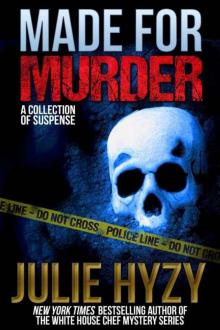 Made for Murder
Made for Murder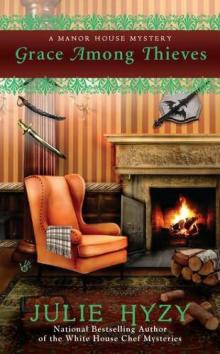 Grace Among Thieves
Grace Among Thieves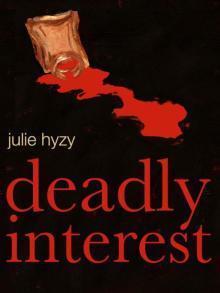 Deadly Interest
Deadly Interest Deadly Blessings
Deadly Blessings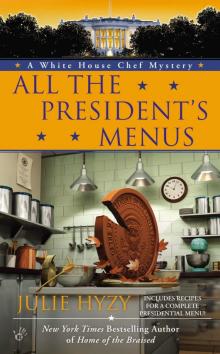 All the President’s Menus
All the President’s Menus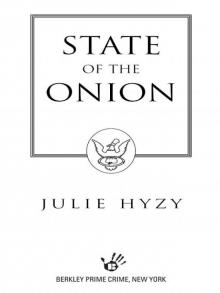 State of the Onion
State of the Onion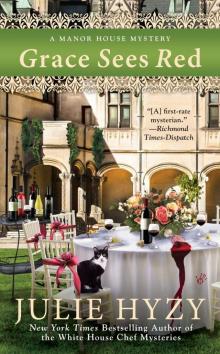 Grace Sees Red
Grace Sees Red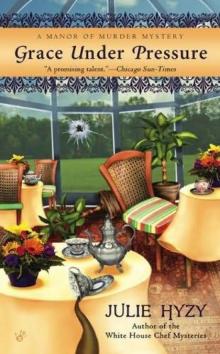 Whitehouse Chef 04 - Grace Under Pressure
Whitehouse Chef 04 - Grace Under Pressure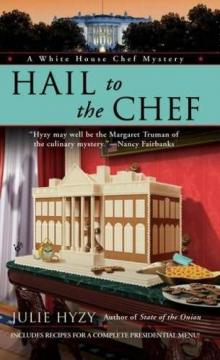 Hail to the Chef
Hail to the Chef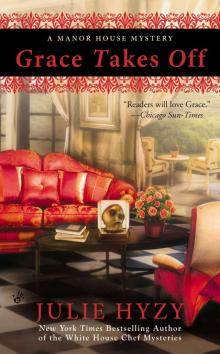 Grace Takes Off
Grace Takes Off Grace Against the Clock (A Manor House Mystery)
Grace Against the Clock (A Manor House Mystery) Grace Cries Uncle
Grace Cries Uncle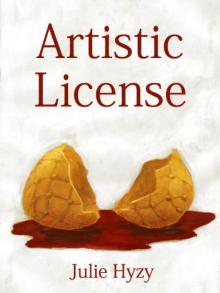 Artistic License
Artistic License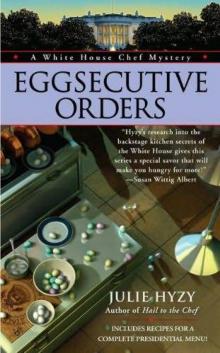 Eggsecutive Orders
Eggsecutive Orders Grace Interrupted
Grace Interrupted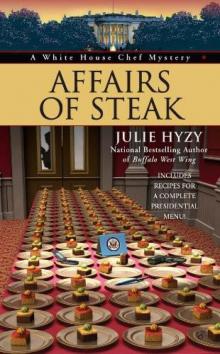 Affairs of Steak
Affairs of Steak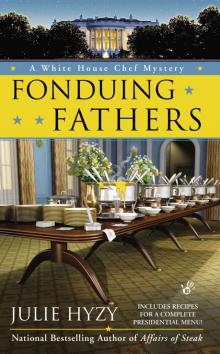 Fonduing Fathers
Fonduing Fathers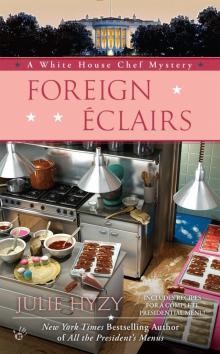 Foreign Éclairs
Foreign Éclairs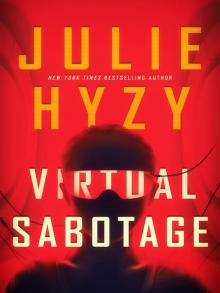 Virtual Sabotage
Virtual Sabotage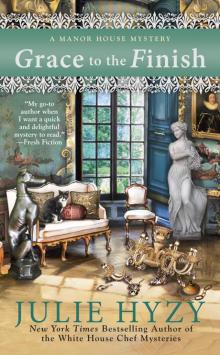 Grace to the Finish
Grace to the Finish